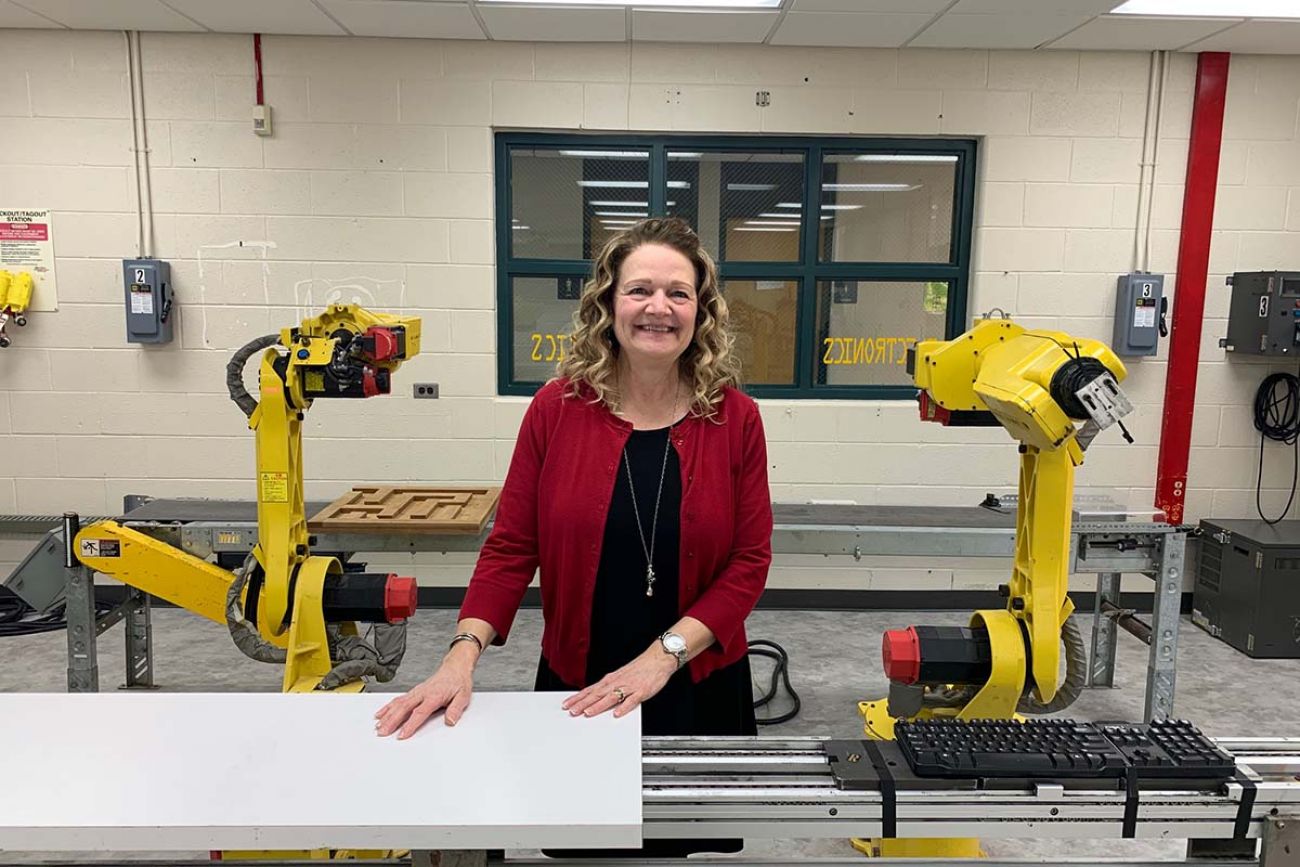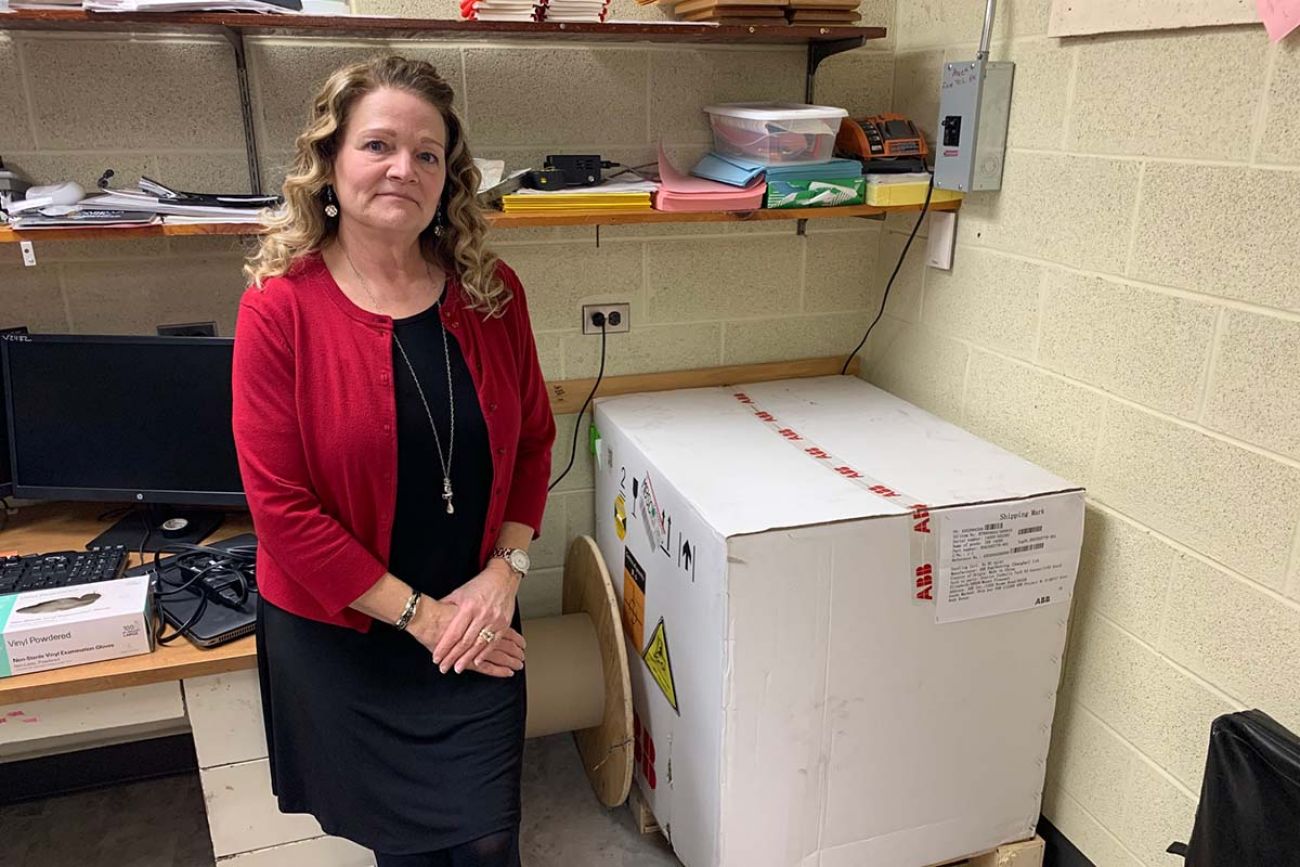Michigan needs skilled workers, but lacks enough instructors to train them

MT. PLEASANT—Mary Kay Voeks unlocked the door to a darkened classroom at Mt. Pleasant High School. She flicked on the lights to reveal 12 empty desks with 3-D printers on each of them.
In the front of the room were two large, yellow robotic arms.
Two years ago, this classroom, along with a fully outfitted computer lab across the hall, were filled with 60 students a day learning industrial electronics, computer programming and robotics.
Related:
- $100M Kalamazoo career tech center shows promise, inequities in Michigan
- As Gretchen Whitmer pitches Michigan education, a lag in college enrollment
- Whitmer: Tap Michigan’s budget surplus to boost K-12, pre-K, mental health
But the classrooms have gathered dust the past two school years.
It’s not for lack of interest — students from across Isabella and Gratiot counties sign up for this career and technical education program every spring. And businesses in the mid-Michigan region still want employees with skills in robotics, said Voeks, the principal of the Gratiot-Isabella Technical Education Center, which is located in a wing of the high school
But career tech officials can’t find an instructor.
The program instructor at Mt. Pleasant High quit in August 2020. For 18 months, Voeks has been advertising for a replacement — someone with technical know-how, no teacher license required — and received zero applications.

The reason is simple, sobering, and similar to what is happening at some other career tech centers around the state:
“People in this industry are getting paid three times what a (K-12 classroom) teacher would be paid,” Voeks said.
CTE enrollment in Michigan has grown 21 percent since 2013-14. More than 100,000 high school students — 30 percent of all 10th- through 12th-graders — took at least one CTE class in 2020-21.
Career tech programming has taken on greater importance as Michigan businesses have struggled to find enough skilled workers.
That same worker shortage has hit CTE. The more demand there is for skilled workers in a field, the harder it becomes to find instructors to offer training in that field. While businesses can increase pay to find skilled workers, high school-level career and tech education programs are limited to the pay scale of traditional teachers, because of union contracts that set school district pay scales, according to CTE administrators who spoke to Bridge.
Recently in the Gratiot-Isabella Career Center, “we had a mechanical drafting instructor who resigned after the first trimester of this year,” said Doug Bush, associate superintendent of CTE. “They were offering him $25,000 more to come back to work for his old employer.
“Luckily, we found a replacement,” Bush said.
New instructors, no matter if they are experts in culinary arts or computerized manufacturing, are usually paid the same pay as a first-year teacher, which is typically under $40,000 a year.
By comparison, the average salary in Michigan for an HVAC (heating, ventilation and air condition) technician is, including overtime, $65,000 a year.
“We have had an HVAC class, state approved, for two years, and we cannot find an instructor,” said Chris Machiniak, assistant superintendent of career and technical education for Berrien Regional Educational Service Agency, which provides services for school districts in that west Michigan county.
“The higher skill you get, the more they can walk out and make three times in the private sector what they can make in (CTE),” he said.
Machiniak said CTE classes related to engineering, manufacturing and industrial technology have been particularly hard hit by the worker shortage.
“We’ve had business and industry pressure put on us” to offer industry-related classes, he said. “We said, ‘look, give us someone (one of your employees) part-time (as an instructor).’ But they can’t find enough people to do the work they have, so they can’t.
“If we can build a pathway (to train more students in CTE), we could be cranking kids out in a year or two,” Machiniak said. “But (businesses) need people now.”
CTE instructors in Michigan need certification in their field, but are not required to have a teaching license, any background in education or a college degree of any kind.
Instructors who lack a college degree are required to take classes toward a degree in their field, but they have 10 years to complete the degree, said Gratiot-Isabella’s Voeks.
Still, Voeks’ center has had no luck finding anyone who would allow her to unlock the computer and electronic robotics labs for good.
“We may have to find a young person or someone who’s retired,” Voeks said.
“That’s the niche, and we haven’t found them yet.”
After the instructor left in August 2020, the Mt. Pleasant career tech center received delivery of a new industrial robot.
The box sits in a closet, unopened.
Voeks picked up a plastic face mask filter from one of the desks in the industrial electronics and computer lab. It’s the last project students completed on the center’s 3-D printers. in the spring of 2020.
“It’s disappointing we have such an outstanding place for students and it sits idle,” Voeks said. “There are so many jobs out there. We’re the pipeline, and I feel bad we can’t fill that pipeline.”
Funding for this article was provided through a Higher Education Media Fellowship sponsored by the ECMC Foundation and administered by the Institute for Citizens & Scholars, awarded to Bridge Michigan's Ron French.
Michigan Education Watch
Michigan Education Watch is made possible by generous financial support from:
Subscribe to Michigan Health Watch
See what new members are saying about why they donated to Bridge Michigan:
- “In order for this information to be accurate and unbiased it must be underwritten by its readers, not by special interests.” - Larry S.
- “Not many other media sources report on the topics Bridge does.” - Susan B.
- “Your journalism is outstanding and rare these days.” - Mark S.
If you want to ensure the future of nonpartisan, nonprofit Michigan journalism, please become a member today. You, too, will be asked why you donated and maybe we'll feature your quote next time!





